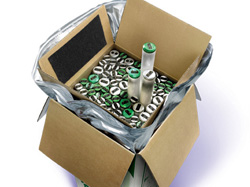Solar developers are looking to the Mojave Desert for the construction of solar plants that could turn the sun’s heat into electricity.
Using smart technology to automate our technology devices at home could help reduce energy use and utility bills.
Siemens will provide energy efficiency upgrades to Manchester Memorial Hospital under a $4.9 million contract with Eastern Connecticut Health Network (ECHN).
"By using transparent superhydrophobic coatings on collector mirrors, we can create high performance and low maintenance concentrating solar power electricity generation," team leader Scott Hunter said.
The British insurance market reports it is providing specialist cover to an increasing number of them, and they're the fastest-growing form of alternative energy globally.
Four researchers from Carnegie Mellon University’s Green Design Institute discuss their more conservative estimates of greenhouse gas emission reductions in two papers this month.
Highlands, a multi-family development operated by Sacramento|Yolo Mutual Housing Association, received 121 points from Oakland-based Build It Green (BIG).
The company announced it will stop drilling into deepwater zones for this year but will drill the top portions of as many wells as possible during the remaining season, then cap and temporarily abandon them.
Both are headquartered in Texas. R360 is a leading provider of non-hazardous oilfield waste treatment, recovery, and disposal services.
DEP Secretary Mike Krancer said the seminar series will inform local governments and businesses "about how they can take advantage of an abundant, clean-burning, and inexpensive fuel found right here in Pennsylvania" and "will help us develop our grant program moving forward."
BP announced it is using a new technology called LoSal® EOR at its Clair Ridge field to create low-salinity water for "waterflooding" from sea water. The company estimates this method will produce about 42 million additional barrels of oil.
A new “Wind Technologies Market Report” from the U.S. Department of Energy shows how quickly the installation of wind energy equipment progressed in the United States during 2011.
Renewable energy technologies generally consist of two distinct processes: energy generation (using sources such as coal, solar, wind, etc.) and energy storage (such as batteries).
Earlier this year the Raleigh Police Department installed mobile power idle reduction systems in 29 police vehicles. The project was funded by an Energy Efficiency and Conservation Block Grant, and aligns with Raleigh's commitment to environmental protection outlined in the City's Comprehensive Plan.
Researchers may have discovered a new method to predict solar flares more than a day before they occur, providing advance warning to help protect satellites, power grids and astronauts from potentially dangerous radiation.
Engineers at Oregon State University have made a breakthrough in the performance of microbial fuel cells that can produce electricity directly from wastewater, opening the door to a future in which waste treatment plants not only will power themselves, but will sell excess electricity.
Two researchers have reprised in the journal Energy Policy their groundbreaking finding that improvements in lighting — from candles to gas lamps to electric bulbs — historically have led to increased light consumption rather than lower overall energy use by society.
Stony Brook University scientists have found that the disposal of contaminated wastewater from hydraulic fracturing – commonly known as “fracking” – wells producing natural gas in the Marcellus Shale region poses substantial potential risks of river and other water pollution that suggests additional regulation to reduce the potential of drinking water contamination.
In some isolated clinics in parts of Africa, the electricity needed to power lights and medical devices is generated by expensive imported diesel fuel; the water supply can be so cold in winter that health workers can’t even wash their hands properly. But a startup company established by a team of MIT students and alumni aims to change that.

The popularity of fluorescent lamps and compact fluorescent lamps (CFLs) is steadily growing in the industrial, commercial and residential markets. However, they can also be potentially dangerous because of their mercury content.